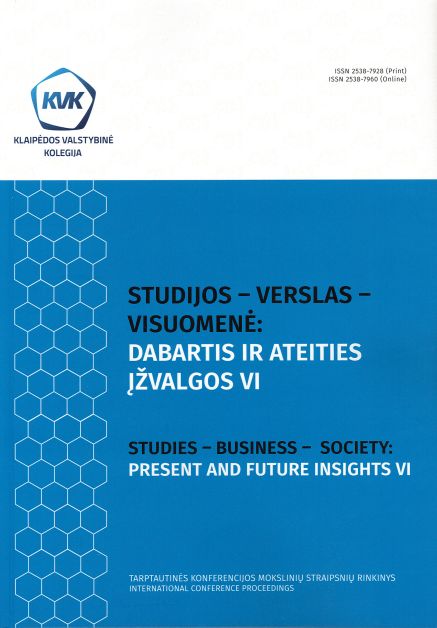TARPTAUTINIŲ PROJEKTŲ VYKDYMAS IKIMOKYKLINIO UGDYMO ĮSTAIGOSE: PEDAGOGŲ PATIRTIES ANALIZĖ
DOI:
https://doi.org/10.52320/svv.viVI.205Reikšminiai žodžiai:
tarptautiniai projektai, ikimokyklinio ugdymo įstaiga, pedagogaiSantrauka
Straipsnyje pristatomi ikimokyklinio ugdymo įstaigų ypatumai, aptariama mokslininkų ir praktikų siūloma projektų struktūra, tarptautinių projektų bruožai ir pedagogo vaidmuo rengiant ir vykdant tarptautinius projektus. Tyrimo metu buvo aktualu išsiaiškinti kaip kyla projektų idėjos, kokie taikomi metodai, su kokiomis problemomis susiduriama kuriant ir vykdant projektus bei kokios ugdomos vaikų kompetencijos dalyvaujant tarptautiniuose projektuose. Tyrimo objektas – pedagogų patirtis rengiant ir vykdant tarptautinius projektus ikimokyklinio ugdymo įstaigose. Tyrimo tikslas – išsiaiškinti pedagogų patirtį rengiant ir vykdant tarptautinius projektus ikimokyklinio ugdymo įstaigose. Tyrimo metodai: mokslinės literatūros analizė, apklausa žodžiu (pusiau standartizuotas interviu), turinio (content) analizė. Atliekant tyrimą buvo taikyta kriterinė atranka. Tiriamųjų atrankos kriterijai: 1. Ikimokyklinio ugdymo pedagogai turėjo dirbti Klaipėdos miesto ikimokyklinio ugdymo įstaigose; 2. Pedagogai, turėjo vykdyti tarptautinius projektus 2019-2021 metais; 3. Pedagogai turėjo būti patys rengę tarptautinius projektus. Tyrimo imtis – penki pedagogai. Vykdant interviu, buvo laikomasi bendrųjų etikos principų: geranoriškumo, pagarbos asmens orumui, teisingumo, konfidencialumo. Apibendrinus atlikto tyrimo rezultatus galima daryti išvadą, kad kuriant projektus yra bendraujama ir bendradarbiaujama su vaikais, siekiant tobulinti trūkstamus bei gilinti esamus gebėjimus, kompetencijas, todėl remiantis šiais kriterijais yra formuluojami tarptautinių projektų tikslai ir uždaviniai. Pažymėtina, kad kuriamuose tarptautiniuose projektuose nemažas dėmesys skiriamas ne tik visų penkių (komunikavimo, socialinės, pažinimo, sveikatos, meninės), bet ir tarpkultūrinės kompetencijos ugdymui. Ypatingai išskiriama informacinių priemonių ir įrankių naudojimo svarba tiek pedagogui, tiek vaikams. Apklaustieji pedagogai išskiria tarptautinių projektų rezultatų viešinimo/sklaidos svarbą. Vykdomi baigiamieji renginiai su partneriais, pateikiamos ataskaitos ,,eTwinning“ platformoje, socialiniuose tinkluose, internetinėse svetainėse. Taip pat pedagogai dalinasi gerąja patirtimi įvairiuose seminaruose, mokymuose, mokslo mugėse.
Atsisiuntimai
Publikuota
Numeris
Skyrius
Licencija

Atskiri straipsniai yra skelbiami „Open Access“ pagal „Creative Commons“ licenciją CC-BY 4.0, leidžiančią neribotai naudoti, platinti ir atgaminti betkokioje laikmenoje, su sąlyga, kad nurodytas originalus autorius ir šaltinis. Autoriai išlaiko autorių teises į savo straipsnius, tačiau suteikia Klaipėdos valstybinei kolegijai pirmojo leidinio teisę.

